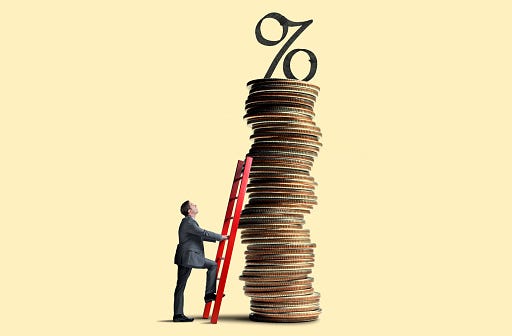During a low-interest-rate environment and high inflationary times, capital preservation assets such as cash and liquid securities do poorly since they end up having negative real interest rates. Despite the poor purchasing power, this is also an opportune time to pay off debt faster and lock in an attractive mortgage rate before they inch higher.
The interest rate paid by fixed-income investments is almost always a nominal interest rate. The nominal interest rate doesn’t account for inflation. Hence the name, nominal, sounds like number.
A fixed-income investment’s real interest rate is the nominal rate — the rate of inflation. For example, if a bond is yielding 4%, but inflation is at 6%, the real bond yield is at -2%.
Currently, it’s hard to make a buck in the markets with the extensive sell-off due to fears of geopolitical risk and rising interest rates. Although correlated to the broader market, the best investment to avoid as much headache would be to long real estate and buy the dip for future returns.
Tapping into a capital preservation strategy such as real estate, cash or cash equivalent liquid securities or corporate bonds during a higher interest rate environment are more favorable than equities such as high flying stocks, memes and crypto.
Just be mindful though, due to higher yields, lower purchase prices for bonds entails higher capital gains tax due once sold.
Capital preservation investments entail:
-U.S. gov’t bonds with varying maturities
-Cash or cash equivalents
-CDs
-TIPS — similar to I savings bonds-help protect investors from inflation by adjusting face value by changes in CPI-measure of inflation(change in prices of goods) principle adjusted for inflation
-I Savings Bonds-currently paying 7.12% variable rate locked in paying an overall rate
-Treasury securities-bills, notes, bonds
-Money-market securities-CDs
-Municipal bonds
These are tax-advantageous and steady coupon-paying investments during a higher interest rate environment. As the Fed plans on pulling the brakes and hiking rates as soon as in March at around 50 basis points, 0.5%, investors are concerned it is too soon and will curtail demand, possibly leading into recessionary territory (2Q decline in GDP). Since the stock market leads the economy by 3–6 months, and housing and construction permits are leading indicators as well, they usually peak when GDP, production of goods and services in the US, and housing prices fall but at the moment, there’s no current indicator of those things happening. The economy and market went through a rollercoaster ride and need to stabilize a bit, unraveling supply-chain bottlenecks and frothy sky-high valuations. Consumer confidence and balance sheets are stronger than ever and the Great Resignation is persistent. Stocks fluctuate in the short term because that’s what they are meant to do. Investing based on emotions does not have a proven track record.
Although there is a ~80% chance the economy will not go into a recession, having a guaranteed return somewhere such as with I savings bonds or TIPS is better than hoping for a possible higher return. That’s why sticking to a capital preservation strategy is best in non-inflationary times. Having secure safe-haven assets a part of your portfolio is prudent no matter what happens. If all things hit the fan, at least you can live off of 10% or so of your net worth along with 6–12 months of emergency expenses you better have on deck. It’s recommended to have at least 5–10% of your investable assets in cash for this reason.
Dealing with the Fed’s hawkish plans mixed with geopolitical tensions, possible tax hikes, and high inflation, non-cyclical stocks, industrials-energy, gold, and bonds are currently leading the charge. Consumer staples, discretionary and government bonds do better during a transitionary stage and recessionary period whereas during an expansionary recovery stage as we’ve seen since March 2020, high-flying tech, cyclical stocks, and meme stocks boom with excess monetary and fiscal stimulus.
When there are rising tensions such as geopolitical fears, investors deviate back to safe-haven assets such as government bonds, another attractive buying opportunity to take advantage of the dip. The average correction during a geopolitical war is ~6.5% and equities soon fly afterward. Take a look at the Afghanistan, Iran, Vietnam, and or Crimea wars as examples within the markets.
Although consumer balance sheets are strong and resilient with retail prices up 4.5% last month, the Fed needs to now wind down their stimulus that helped boost the economy, lower unemployment, and increase job participation. Their ultimate goal is to stabilize the economy and maximize employment which were achieved in no time thanks to billions in bond buying via QE. Clearly, cyclical, tech, at-home stocks, crypto, meme stocks, and crypto have all plummeted due to fear of rising interest rates since they take advantage of low borrowing rates to fuel future expectations and predictions with not enough current cash flow.
Thankfully the markets go up over time and only time will tell how long that will take. Luckily, if you’re a passive long investor or an owner of real estate, not just equities, being able to let go and allow your investments to work for you behind the scenes won’t be so hard.
Now, the markets are gearing up for the Fed and want to make sure it doesn’t pull the brakes too hard on this sustained resilient recovery.

Inflation Saver
So how can we tame inflation on our own without having it eat into our wages and wallets?
As the oceans are melting in the Arctic and a historic drought is occurring in the West, everything is in limbo, including inflation. Similar to the climate crisis, inflation affects everyone differently yet thankfully can be controlled with persistence, close observation, and resilience if you are in it to win it.
As a heads up, personal finance is personal and some of the advice isn’t in fact universal so it’s important to be cautious whenever taking money management advice, especially with inflation.
When In Doubt, Invest
Although cash is king, these days with savings accounts paying at most 0.5% while charging ~20% on overdue credit, it is advised to keep your emergency fund and let the rest be invested. Now it can seem like a tumultuous time to be invested but in reality, it’s the most strategic as stocks are now realizing they need to trade at fundamentals again, not at lofty unicorn angel valuations.
Buying the dip while continuing to index, through a passive diversified approach is essential. Currently, stocks are trading at 15–30x their adjusted earnings. This is an unprecedented level for CAPE-cyclically adjusted P/E and realistically 15% growth is even audacious. Luckily we can finally get a better picture on which stocks are defensible and which ones were fads. Bye-bye Robinhood and GameStop.
Passive investing historically beats out active investing over time for this reason. Less emotional investing and more of a hands-off approach are proven to work better. With less mental exhaustion, more diversification, fewer expense ratios, and tax burden dig into ETFs and index funds that track and mirror a broader market as a whole. It will serve you better than spending double.

Quick Tips to Reduce the Impact of Inflation
Financial literacy will teach you how to manage your money. Investing will teach you how to invest and spend will teach you how to own and dump.
We all have 3 main ways to spend our money and during this time when inflation is at a 40-year high at 7.5%, being extra mindful is the way to go.
Understand Nothing Lasts Forever
You can approach this with the YOLO mindset or patience is a virtue mantra. I would suggest going with the latter to be best prepared. See what you can cut out. I’m sure more than you expect. We are all dealing with subscription fatigue so pay attention to what you’re paying for that you really don’t need. Although I’ve been bugged by Spotify premium ads multiple times a day for the past 4 or so years, I still prevail against it since it’s one less transaction and monthly recurring payment I have to deal with. Or with coffee. I’m not a coffee drinker due to sensitivity reasons but far too many people cannot live without it. What do they also have in common? Debt that they don’t prioritize!! Although coffee grabs are a thrilling part of the morning routine, if you don’t have to, save a couple thousand per year at home because it really does add up. Put in the work, for the savings to work for you.
When In Doubt, Invest It AGAIN
Those in the top 10% and above income brackets save almost 60% or more of their income each month since regressive tax on necessary goods and staples don’t take a hit as much on their budget. As much as you can, hide that paycheck away from you and strive to save at least 30% of your income.
Don’t be like the national average at less than 10% again. That’s no secure way to live and it won’t make your life easier. Buy what you need, not what you want during this time and you’ll feel better about yourself. With those savings, invest it passively or allocate no more than 3% of your portfolio in individual stocks or asset classes that are more volatile than you can stomach.
No risk = no outsized return. Ask yourself, are you willing to beat the market and be a temporary lottery winner or stay wealthier long-term stress-free?
Last but not least, aggressively save and invest as much as you can by divesting more of your paycheck into your tax-advantaged, pre-tax accounts. Make sure to max them out so your employer can do a free match for your retirement accounts and max out to $6k on the post-tax ROTH IRA before tax hikes come into effect and you start earning more due to the wage-price spiral with inflation.
Pay Down Debt
There’s nothing more satisfying than taking care of your home. It is the asset you should prioritize since the people you love live in it and it is one of the few investments where you have a lot of control over its worth and price point. You can choose to remodel it or sell it at a peak time when national median sales are ~18% above average.
Owning a home not only builds equity but also a lasting savings habit. It teaches homeowners to pay their monthly dues or else they will be kicked out into foreclosure or even worse, bankruptcy. As higher interest rates take effect, a strong sign of a booming economy, mortgage rates indicate there will be less competition, speculation, bankruptcies, defaults, and its a prime opportunity for cashed-up buyers to lock-in a more solid rate without all the competition from marginal buyers.
If you were able to lock in or refinance an attractive 30 year fixed rate mortgage during the pandemic for your starter or 5th weekend home, make sure to get rid of any additional debt, specifically high-interest toxic debt faster than ‘healthy debt’ such as student loans, mortgage, business loans to be financially free, flexible, and be able to invest in appreciable assets. There’s no better time than now as inflation is eroding our debt!
Look Around
Just because inflation is biting you somewhere doesn’t mean you can’t shop around and see where it hurts less. There’s not just 1 route in life. You must call and negotiate to see where you can save. Companies make this difficult and get the most sales from making people’s lives, well, more difficult. From extra fees to impossible cancellation options, those with patience and grit save more in the end and yes, it’s always worth it since it compounds. For a relevant example, see SNL ‘s Optimumum customer service commercial skit for a good laugh. Eventually, after the 60 transfers and classical music, you will get what you want!!
I guarantee you you are eligible for some discount or lower rate somewhere! We all are. These are flexible terms after all.
The other day I called a service provider and simply asked if I could pay less to renegotiate my TV bundle. After some friendly chit-chat and mention of being a student, my monthly $150 bill went down to $25 with last year’s refund!
You don’t know until you ask. Be patient with the process and know how to negotiate.
You can control inflation or it can control you.
If you set your mind to it, nothing can stop you.
As cliche as this sounds, monitoring and combating inflation is all in your hands, alongside preparing for slipups in the markets to life which are bound to happen eventually.
What’s certain is uncertainty. Prepare for the worst, hope for the best to keep what you deserve.

